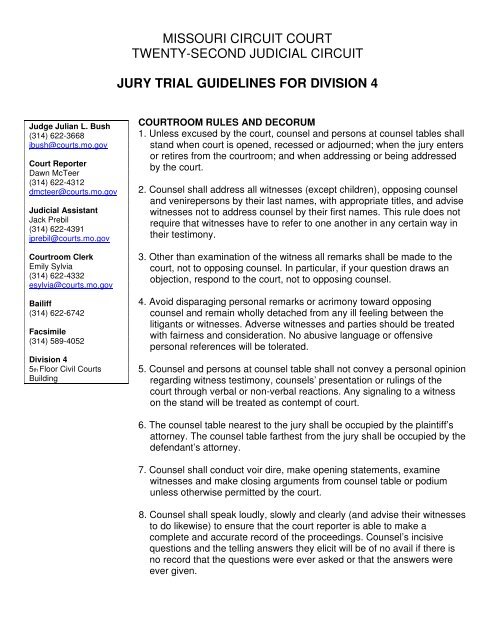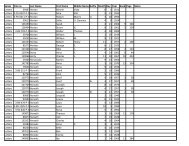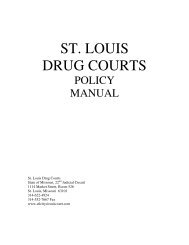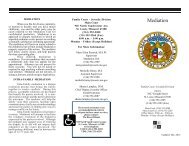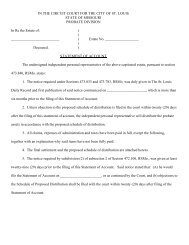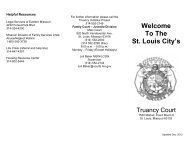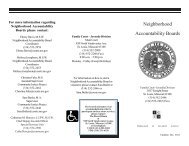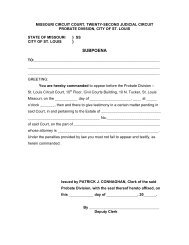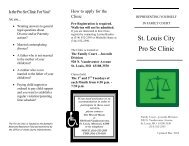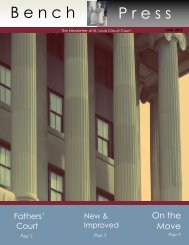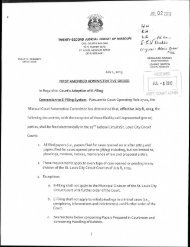JURY TRIAL GUIDELINES FOR DIVISION 4.pdf - 22nd Circuit Court ...
JURY TRIAL GUIDELINES FOR DIVISION 4.pdf - 22nd Circuit Court ...
JURY TRIAL GUIDELINES FOR DIVISION 4.pdf - 22nd Circuit Court ...
You also want an ePaper? Increase the reach of your titles
YUMPU automatically turns print PDFs into web optimized ePapers that Google loves.
MISSOURI CIRCUIT COURT<br />
TWENTY-SECOND JUDICIAL CIRCUIT<br />
<strong>JURY</strong> <strong>TRIAL</strong> <strong>GUIDELINES</strong> <strong>FOR</strong> <strong>DIVISION</strong> 4<br />
Judge Julian L. Bush<br />
(314) 622-3668<br />
jbush@courts.mo.gov<br />
<strong>Court</strong> Reporter<br />
Dawn McTeer<br />
(314) 622-4312<br />
dmcteer@courts.mo.gov<br />
Judicial Assistant<br />
Jack Prebil<br />
(314) 622-4391<br />
jprebil@courts.mo.gov<br />
<strong>Court</strong>room Clerk<br />
Emily Sylvia<br />
(314) 622-4332<br />
esylvia@courts.mo.gov<br />
Bailiff<br />
(314) 622-6742<br />
Facsimile<br />
(314) 589-4052<br />
Division 4<br />
5th Floor Civil <strong>Court</strong>s<br />
Building<br />
COURTROOM RULES AND DECORUM<br />
1. Unless excused by the court, counsel and persons at counsel tables shall<br />
stand when court is opened, recessed or adjourned; when the jury enters<br />
or retires from the courtroom; and when addressing or being addressed<br />
by the court.<br />
2. Counsel shall address all witnesses (except children), opposing counsel<br />
and venirepersons by their last names, with appropriate titles, and advise<br />
witnesses not to address counsel by their first names. This rule does not<br />
require that witnesses have to refer to one another in any certain way in<br />
their testimony.<br />
3. Other than examination of the witness all remarks shall be made to the<br />
court, not to opposing counsel. In particular, if your question draws an<br />
objection, respond to the court, not to opposing counsel.<br />
4. Avoid disparaging personal remarks or acrimony toward opposing<br />
counsel and remain wholly detached from any ill feeling between the<br />
litigants or witnesses. Adverse witnesses and parties should be treated<br />
with fairness and consideration. No abusive language or offensive<br />
personal references will be tolerated.<br />
5. Counsel and persons at counsel table shall not convey a personal opinion<br />
regarding witness testimony, counsels’ presentation or rulings of the<br />
court through verbal or non-verbal reactions. Any signaling to a witness<br />
on the stand will be treated as contempt of court.<br />
6. The counsel table nearest to the jury shall be occupied by the plaintiff’s<br />
attorney. The counsel table farthest from the jury shall be occupied by the<br />
defendant’s attorney.<br />
7. Counsel shall conduct voir dire, make opening statements, examine<br />
witnesses and make closing arguments from counsel table or podium<br />
unless otherwise permitted by the court.<br />
8. Counsel shall speak loudly, slowly and clearly (and advise their witnesses<br />
to do likewise) to ensure that the court reporter is able to make a<br />
complete and accurate record of the proceedings. Counsel’s incisive<br />
questions and the telling answers they elicit will be of no avail if there is<br />
no record that the questions were ever asked or that the answers were<br />
ever given.
9. Suggestions of counsel looking to the comfort or convenience of jurors should be made to the<br />
court out of the jury's hearing.<br />
10. Counsel shall seek permission of the court to approach a witness for the first time. If permission is<br />
granted it need not be obtained again unless the court has withdrawn it. Counsel shall request<br />
permission before approaching the bench.<br />
11. Depending on the type of case, children may not be permitted in the courtroom whether or not<br />
accompanied by an adult when court is in session.<br />
PRE<strong>TRIAL</strong> MOTIONS<br />
Motions in limine and other pretrial motions may be scheduled by contacting the courtroom clerk.<br />
These matters should be scheduled as soon as possible and preferably not later than the week<br />
before trial. Before presenting a motion in limine to the court, counsel should discuss the issues with<br />
opposing counsel. Often counsel will be able to agree on most if not all points, and the burden on the<br />
court is diminished. The court and the clerk shall be notified promptly if a case is settled after it has<br />
been set for trial. It is a basic courtesy, and it also makes it easier on the lawyers on cases that are<br />
scheduled behind you on the docket.<br />
<strong>JURY</strong> INSTRUCTIONS<br />
Each party who has the burden of proof on a claim or defense shall provide proposed jury instructions<br />
to the court and to the other parties not later than the conclusion of voir dire, unless otherwise<br />
directed by the court. This is required by the local court rules and will be enforced. Proposed<br />
converse or responsive jury instructions shall be provided to the court not later than the morning after<br />
receiving the other party’s proposed jury instructions. Parties shall submit a “clean” copy and a “dirty”<br />
copy of each instruction proffered. The dirty copy shall contain citations of authority and also indicate<br />
whether it was prepared at the court’s direction or by which party it was tendered. Plaintiff shall also<br />
provide a proposal for the numerical order that the instructions should be read to the jury. In addition<br />
to providing hard copies, the parties are expected to be able to make changes while in chambers;<br />
therefore, counsel shall bring their instructions on a compact disc, flash drive, or email them to the<br />
court.<br />
JURORS AND VOIR DIRE<br />
1. Number of Jurors and Seating: The size of the jury panel will depend on the nature of the case and<br />
length of the trial. Generally, the court finds 36 sufficient for most civil cases lasting one week or<br />
less, and 42 sufficient for most criminal cases not involving drugs, guns, sex or children. Those<br />
cases usually require 48 or more. The venire panel is seated from right to left beginning in the back<br />
row of the jury box and moving down to the chairs and benches in the courtroom.<br />
2. Juror List: Counsel will be provided with a jury panel list as soon as possible. Unless otherwise<br />
ordered, no counsel or party may view a voir dire list except during voir dire after the panel has<br />
been called in to the courtroom. Counsel and the parties shall return their voir dire lists to the clerk<br />
at the conclusion of voir dire.<br />
3. Supreme <strong>Court</strong> Rule 69.025: The court will give all parties an opportunity to conduct a reasonable<br />
inquiry as to whether a prospective juror has been a party to litigation. Counsel can access<br />
Case.Net on their personal computers through the court’s WiFi system. Counsel are strongly
encouraged to have their Case.Net search conducted while voir dire proceeds so that jury<br />
selection is not delayed.<br />
4. Voir Dire Examination: In criminal cases, the court will open voir dire by reading MAI-CR 300.02. In<br />
civil cases, the court will open voir dire by explaining its purpose and describing the voir dire<br />
procedure to the jury and the nature of the case. At the request of counsel, the court will also<br />
inquire into any specific area relevant to the case. General voir dire will be conducted by counsel.<br />
The purpose of voir dire is to get each venireperson to speak and determine if some obstacle to<br />
fairness exists. A secondary purpose is to elicit information to use in making peremptory strikes.<br />
Despite what counsel may have been told at a trial practice seminar, it is not the time to argue or to<br />
try one’s case. In particular, voir dire should not be used to interview citizens ad nauseum. Counsel<br />
shall not question the venire regarding hardship excuses: each summoned juror has been given an<br />
opportunity to present a request for a hardship excuse before being sent to the courtroom. In a<br />
case extending beyond one week, the court will raise the subject of hardship on its own. Counsel<br />
should not invite jurors to have a side bar conference with the court: it is the court’s sidebar and no<br />
one is to approach without being first authorized by the court. If a juror indicates a desire to<br />
approach the sidebar, counsel may ask the court if the juror can come to the sidebar, and the court<br />
will ordinarily allow it. Do not block the court reporter’s view of a venireperson who is speaking.<br />
5. Jury Selection: At the completion of voir dire, the venire panel will be excused from the courtroom<br />
and asked to be available for further questioning on an individual basis during the strikes for cause<br />
process. After the strikes for cause are made, the peremptory strikes will be made by the parties.<br />
<strong>TRIAL</strong><br />
1. Time of Trial: Trial typically begins at 9:00 a.m. and concludes not later than 5:00 p.m. The parties<br />
are expected to be prepared to begin promptly, so the jury is not kept waiting. Counsel will not be<br />
permitted to raise preliminary matters at the start of the trial day when the jury is ready to proceed.<br />
Upon request, the court will be available to resolve preliminary matters 30 minutes prior to the<br />
scheduled start time of the trial day, during the lunch break, or at the conclusion of the trial day.<br />
2. Witnesses: Counsel shall provide a witness list to the court, court reporter and opposing party prior<br />
to trial. Counsel shall disclose to the court the identity and order of witnesses as far in advance as<br />
possible, but not later than the beginning of each day of trial. Counsel is expected to have<br />
witnesses available to testify one after the other and to fill the entire trial day. Only one attorney for<br />
each party shall examine or cross-examine each witness. The attorney stating the objections, if<br />
any, during direct examination shall be the attorney recognized for cross-examination and vice<br />
versa. The interrogation of each witness may consist of: (a) direct examination; (b) crossexamination;<br />
(c) redirect examination; and (d) recross-examination. No further questioning will be<br />
permitted except by leave of court in extraordinary circumstances.<br />
3. Juror Note-Taking: The court generally allows note-taking by jurors during the trial.<br />
4. Objections: There shall be no speaking objections. Counsel should state only the legal grounds for<br />
the objection and should withhold all further comment or argument unless the court requests<br />
elaboration. Counsel should instruct their witnesses not to answer a question while an objection is<br />
pending.<br />
5. Stipulations: Offers of, or requests for, a stipulation should be made privately, not within the<br />
hearing of the jury unless made by previous arrangement between counsel and the court.
6. Sequestration Rule: If you wish to exclude potential witnesses from the courtroom during trial, you<br />
must advise the court before the start of testimony. Once in place, the rule will remain in place for<br />
the entire trial, and each attorney is charged with the duty of seeing that the witnesses comply with<br />
that rule. If any witness violates the rule, whether willfully or otherwise, such witness shall not be<br />
permitted to testify, except by consent of opposing counsel or unless the court, in its own<br />
discretion, rules that justice requires such testimony be received. Unless the court should direct<br />
otherwise (and it won’t), the sequestration rule doesn’t apply to parties or experts.<br />
EVIDENCE/EXHIBITS<br />
1. Any party offering interrogatories and answers as evidence shall first provide to the court and the<br />
opposing party a written list which separately sets out in full each interrogatory together with<br />
response thereto.<br />
2. The attorney is responsible for all exhibits before, during and after trial. Exhibits should be marked<br />
for identification prior to trial. Plaintiff should use numbers and defendant should use letters. An<br />
exhibit list shall be provided to the court, court reporter and opposing party prior to trial.<br />
3. Any paper or exhibit not previously marked for identification should be marked before it is tendered<br />
to the court or a witness for examination. Any exhibit offered in evidence should at the time of such<br />
offer be handed to opposing counsel if a copy thereof has not already been delivered before it is<br />
tendered to the witness.<br />
4. The location of easels, screens, large exhibits, demonstrative evidence and/or equipment used to<br />
display said exhibits and demonstrative evidence shall be determined in joint conversation with<br />
counsel and the court. Equipment and exhibits shall not be placed on the rail in front of the jury box<br />
or in the space between the witness box and the jury without permission of the court. In the event<br />
counsel wants witnesses to step down from the witness chair and utilize exhibits or demonstrative<br />
evidence, they shall ask permission from the court.<br />
5. If either party intends to use any depositions or portions thereof in lieu of calling a live witness, it is<br />
incumbent upon counsel to review the deposition with opposing counsel and attempt to resolve all<br />
possible objections in the deposition. Any remaining objections must be presented to the court for a<br />
ruling well in advance of the proposed use of the deposition, so that the court can rule on any<br />
objections in time for counsel to make the necessary edits without wasting jury time.<br />
6. Use of exhibits during opening statements is permitted as long as you have consent from opposing<br />
counsel and advise the court in advance.<br />
7. At the conclusion of trial, counsel shall withdraw their exhibits on the record. Any exhibits which are<br />
not withdrawn shall be retained by the court for thirty (30) days. If said exhibits are not claimed by<br />
counsel within said time, they will be destroyed.<br />
EXPERT WITNESSES<br />
The court will not tell the jury that anyone is an expert. Counsel should not ask the court to tell the jury<br />
that your witness is an expert or is qualified to give expert testimony and should not “tender the<br />
witness as an expert” in front of the jury. The court will simply allow or exclude the testimony<br />
depending on whether it is properly admissible and not add its blessing in front of the jury.
CLOSING ARGUMENTS<br />
In civil causes tried before a jury, the plaintiff shall have the privilege of opening and closing the<br />
argument. The plaintiff’s opening argument shall be made after all the evidence is in and after the<br />
instructions have been read to the jury. Should the plaintiff decline to make the opening argument, he<br />
will be considered as thereby having waived his privilege of closing the argument, and shall not be<br />
allowed to do so, but the defendant shall nevertheless have the privilege of making his argument.<br />
Before argument of counsel begins, the court will determine how much time will be allowed each side<br />
for argument, each side being allowed the same length of time. The plaintiff may apportion the time<br />
allowed him between his opening and closing arguments as he may choose, provided he shall not<br />
consume more than half of his time in his closing argument. In those cases in which the court decides<br />
that the defendant has the affirmative of the issues, he shall have the privilege of opening and closing<br />
the argument in like manner and under the same restrictions as above laid down for the plaintiff.<br />
Before argument of counsel begins, the court may, in its discretion, change the order of argument as<br />
above prescribed in a particular cause. The court may, in its discretion, allow the argument in a<br />
particular cause to extend beyond the allowed time if the circumstances in the opinion of the court<br />
render it proper to do so. Argument of counsel in criminal causes shall be in the order prescribed in<br />
Missouri Supreme <strong>Court</strong> Rule 27.02.<br />
POST-<strong>TRIAL</strong> JUROR CONTACT<br />
No attorney or client, their agents or representatives, shall contact any member of a jury which has<br />
heard evidence in any cause in this circuit; provided, however, the court in its discretion may grant<br />
permission to attorneys or clients to discuss a case with jurors immediately after the return of a<br />
verdict; provided further, the court may also allow contact with jurors if necessary for purposes of a<br />
timely after-trial motion filed under Missouri Supreme <strong>Court</strong> Rules.


